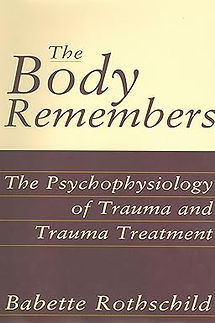

Trauma and Sexual Abuse
Trauma is a psychological response to a dangerous event or period of time that continues to cause emotional distress for the individual. Parts of the psyche may feel 'stuck' in the event. The mos common forms of trauma I see having deep impacts on sex and relationships is sexual abuse, domestic violence, and religious abuse.

Sexual Violence and Abuse
Unfortunately all genders, age rangers and cultures can experience sexual abuse over the lifespan. Our most common abusers are family members, partners and spouses, family friends and trusted community members (teachers, religious leaders, doctors, coaches etc). Sexual abuse can cause long lasting psychological damage for the survivor which extends into ones sexual life. Sexual violence includes any form of sexual contact that is forced, manipulated or coerced. Non consensual sexual contact includes being touched, being watched, kissed or exposed to sexual dynamics that you do not consent to.
Rape
Rape occurs when someone penetrates your body against your will. Rape can lead to STI's. unplanned pregnancy, genital scarring and long lasting psycho-somatic effects. Raape Trauma Syndrome includes flashbacks, intrusive thoughts and memories, low self esteem and a general feeling of unsafety. Dissociation is another common reaction, as well as hypersexual behaviours.


Childhood Sexual Abuse
Adult survivors of childhood sexual abuse have often never been able to tell anyone about their experience until adulthood. You may be living a very successful life with this painful memory locked away in an emotional vault- or alternatively may be suffering long term mental health struggles or even personality disruptions (such as borderline personality disorder or CPTSD). We do not focus on recovering memories, but rather to work with how you feel and how your body feels.
Domestic and Family Violence
Family and domestic violence includes any behaviors that make you feel scared and unsafe in your family unit or domestic space. It is most commonly perpetrated by people who live with you such as parents, partners, siblings, grandparents or even flat mates. intimidation, threats, financial control, co-ersive control, gaslighting, isolating you from family and friends.


The effects of Family & Domestic Violence on Sex
Family and domestic violence can effect your ability to connect intimately and vulnerably with your partner- even if your partner is a safe, gentle and trustworthy person. Neglect, psychological abuse, addictions, and developmental trauma can leave survivors in a state of constant hypervigilance, feelings of worthlessness, and difficulty feeling safe being loved and being sexually intimate
Religious Abuse
Religious abuse and spiritual abuse occur when a belief system is used to control your behavior or manipulate you. One of the difficulties for survivors of religious abuse is that the religious beliefs themselves are often weaponized in the manipulation process, and your submission to the group norms are presented as part of the spiritual practice. Abuse of power in the religions hierarchy, or between genders can result in financial abuse, sexual abuse and emotional abuse.


The effects of Religious and Spiritual abuse on Sex and relationships
Many organised religions have very specific rules and regulations around sex. From purity culture, to sexual submission and exploitation, religions have a dark history in controlling the sexual self. People who have experienced religious abuse commonly have difficulties in expressing and enjoying their sexuality without fear or guilt. Many people end up exiting religion and need support to reconnect with their bodies and autonomy. Others still feel a deep spiritual connection to their beliefs, but want to deconstruct their learned behaviours around sex and relationships.

PTSD
Post Traumatic Stress Disorder (PTSD) can occur after a violent or traumatic or life threatening event. This occurs when the person has ongoing emotional and psychological symptoms that they do not recover from. The symptoms are in four basic groups:
Recurrence- flash backs, panic attacks, nightmares and intrusive thoughts. Physiological symptoms of extreme stress or fear (increased heart rate, dry mouth, shaking hands, sweating)
Avoidance- Avoiding situations (ie sex, bars, parties), locations or relationships that trigger symptoms.
Reactivity- increased startle response, difficulty falling asleep, quick anger or fear reactions (fight, flight, freeze)
Cognitive- Flash backs, intrusive thoughts, difficulty concentrating, numbness or dissociation, and fauning (tend and befriend).
CPTSD
People experiencing CPTSD (complex PTSD) experience the PTSD symptoms (avoidance, reactivity, recurrence and cognitive impairments), as well as further complications which can alter the persons personality. Due to the personality changes CPTSD is frequently misdiagnosed as borderline personality disorder. CPTSD is more prevalent in people who experienced prolonged trauma, childhood abuse and systematic abuse (for example, racism and political oppression). Some of the main symptoms include:
Emotional Dysregulation- losing control over emotions, or overcontrol over emotions.
Negative Self View- loss of self esteem, extreme guilt and shame, suicidality and suicidal ideation.
Detachment- Dissociation (feeling like you are not present and zoning out), de-realisation (feeling like nothing is real) and depersonalization (feeling detached from your sense of self, or feeing like you may not really exist).
Loss of meaning- Feeling like life, love, work, beliefs have no meaning anymore.
Difficulty in relationships- attachment difficulties such as ambivalence or avoidance of closeness or intimacy OR fear of abandonment and a desperate need for love and acceptance from others.

Trauma Informed Therapy
It is vital to your healing process that your therapist understands how trauma effects you personally, and how to help you manage symptoms such as dissociation, low self esteem, addictions and suicidal thoughts- and is aware of the nervous systems response to trauma in order that therapy actually helps instead of adding to your trauma. Poor therapy can actually compound and increase trauma responses, where as a safe and informed approach can lead to healing and emancipation from long lasting effects of trauma and PTSD.

Consent- What is it?
Legally consent means you give permission for something to happen or enter into an agreement with full understanding of the circumstances or consequences, and you do this freely without coercion. In regards to relationships consent requires that you can say no without threat of consequences. For example, you can say no to going to dinner with someone without fear that you will be punished for the decision . Consent also takes into consideration the power and control dynamics of age, status, and economy.


Enthusiastic & Affirmative Consent
Enthusiastic consent refers to the idea that consent in relationships is more than giving permission, agreeing to something or saying yes- it is something that you actually want to do.
Affirmative consent refers to the need for us to have obtained a verbal enthusiastic "yes" to go ahead with sexual activity, instead of relying on a "no" to know when to stop. Escalation of sexual activity (such as moving from kissing to touching, or touching to taking off clothes, or to penetration) requires that you ask each other- do you want to do this? Rather than going ahead and relying on the other person to say "stop" when they feel uncomfortable.
Authentic Consent
Authentic consent is a term I use to explore your own inner desires and conflicts with a particular activity. It is not about your response to another person, but about negotiating your inner conflicts and needs. For example, you may have an opportunity to try something new sexually, you may be interested and turned on by the idea but also a bit scared or feel shame about admitting your desire. You may want to have sex with someone but also feel uncomfortable with the situation or location. Authentic consent requires that you have the time and space to explore these different parts of yourself, and the ability to 'dip your toe in' without feeling like you are strapped in for the whole rollercoaster ride. Consent is moment by moment, and you can stop even if you are enjoying it or getting pleasure from it.



